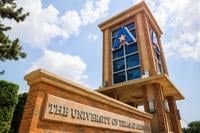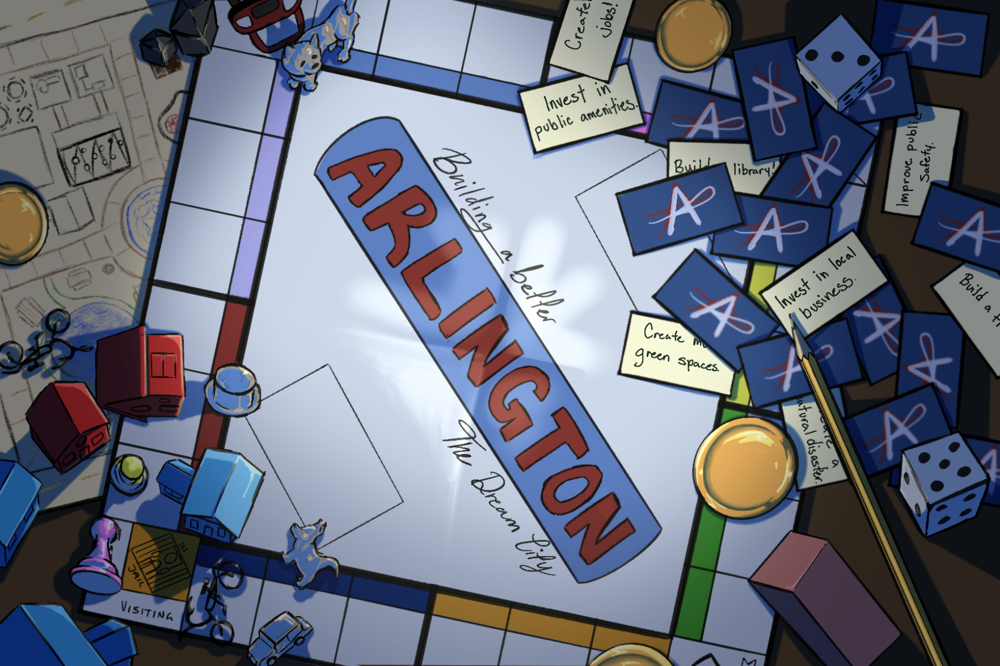
It has been nearly two decades since Ashley Purgason got her master’s degree at UTA.
Since that time, UTA has invested in many more ways to ensure a path for students to complete their career outcomes. More mental health counselors. A free food pantry. A job app, Handshake, matches students with potential internships in the Metroplex.
A few years ago, the university even revamped one of its entities dedicated to students’ achievements — the Division of Student Success.
As the vice provost for Student Success, Purgason worked with over a dozen departments to lead her alma mater to recently become one of three bachelor’s degree-granting institutions nationwide — the only one offering master’s and doctoral degrees — to receive the inaugural Postsecondary Success Recognition Program from the U.S. Department of Education.
The program honors institutions excelling in underserved student population enrollment, supporting successful student transfers and completions while also preparing graduates for careers that promote economic growth.
UTA’s application strength relied on highlighting how the university supported students before their admissions through all the later stages of their experiences, Purgason said.
“It really is about students first, excellence always,” she said. “None of us would be here without this amazing opportunity to serve our students.”
The rigorous application process required UTA to include quantitative and qualitative data on how it served students.
About 47.5% of UTA’s 30,000 undergraduate students received Pell Grants, the federal government’s financial aid for low-income students. Starting fall 2025, more undergraduates will be eligible to attend UTA tuition-free after the expansion of the Blaze Forward program to support students with family incomes of $100,000 or less.
The university had about 41,000 students in fall 2024. Over 50% were minorities. The population consisted of 34% Hispanic, 14% African American and 13% Asian students.
“Our definition of serving centers on advancing our talented students,” said Maria Yareli Delgado, inaugural senior director of Hispanic Serving Institution Initiatives. “Our goal is for all students to advance their academic journey. Our mission is for all students to thrive at our institution.”
While Delgado’s department was created in 2023 to support students and faculty of all ethnicities, UTA received the Hispanic Serving Institution designation in 2014 for enrolling at least 25% of Hispanic undergraduate students entering college for the first time.
Being a UTA alumna, a first-generation student and an immigrant, Delgado understands the worries of the unknown. As she puts it, “You don’t know what you don’t know.” Support from advisers and mentors eventually motivated her to earn her doctorate.
She now provides that same support — planting seeds in students that others planted in her, she said.
Almost three decades ago, when associate director Nikki Dickens was a part-time graduate student-worker, the Career Development Center kept binders to monitor job postings.
The department primarily focused on attracting employers to job fairs, Dickens said. The attention now shifts to students.
The Career Development Center replicates students’ postgraduation experience, guiding them through building resumes, mock interviews, onboarding and the transitioning process to switching careers or preparing for if they get laid off.
But what’s more important, director Lolin Martins-Crane emphasized, is for students to learn about themselves and what they need to make career decisions.
While her department supports both students and alumni, Martins-Crane, a UTA alumna, looks to impact freshmen as early as possible and have them routinely come back during their four years, she said.
“Throughout their career, everything changes, right?” she said. “It’s a story, it’s a journey.”
Handshake, UTA’s career network and job database, has about 150,000 jobs and over 45,000 internship opportunities, Martins-Crane said.
In the 2023-24 academic year, UTA’s Division of Student Affairs recorded increasing numbers of students using the Student Access and Resource Center. The free Maverick Pantry served over 7,000 students, and the Counseling and Psychological Services saw almost 6,000 visits.
Oftentimes the terms wellness and well-being are commercialized as luxurious and expensive, but they represent basic foundations in every student’s life, from acknowledging they don’t get enough sleep, can barely function or are exhausted, said Michelle Kelly, assistant vice president for Health and Wellbeing in Student Affairs.
Kelly’s departments include CAPS and the SAR Center, which contribute to UTA’s success in receiving the recognition.
She and Drew Miller, senior associate vice president for Student Affairs and dean of students, are working together to highlight outreach for students, faculty and staff.
“We know that the more connected and engaged students are, the more likely they are to walk across the graduation stage as opposed to dropping out at some point,” said Miller, whose area covers student organizations, Greek life, the Maverick Pantry and more.
UTA was recognized due to its proactive level of concern about students’ needs rather than making them spend more energy to track things down, he said.
Miller said his area is often seen as the office that covers the gap on students’ behalf when they experience curveballs. It could be an emergency that impacts funding or requires them to serve as caregivers. It could be a mental or physical health emergency. It could be that their academics are impacted.
Miller smiled when the recognition was mentioned. But he became focused as the conversation shifted toward what his department would do next following the recognition.
The goal is to have students reach out before they’re backed into a corner and to target those who don’t ask for help. On a bigger picture level, the Division of Student Affairs is refreshing its strategic plan to create new goals to help students.
He made it clear: The recognition did not stop anything.
“If anything, it just means, ‘Time to work harder and more,’” he said.
@DangHLe














